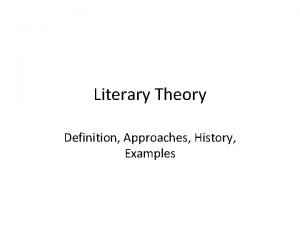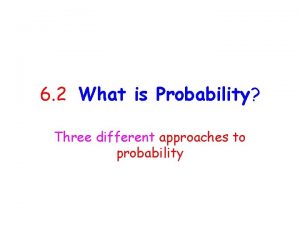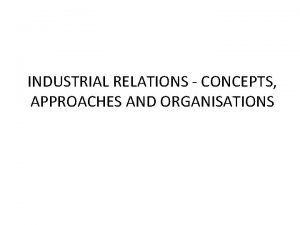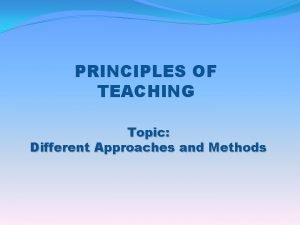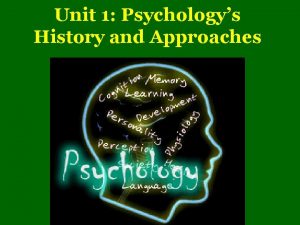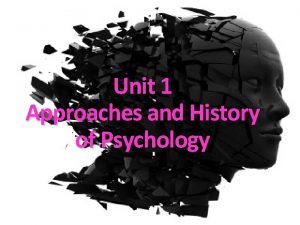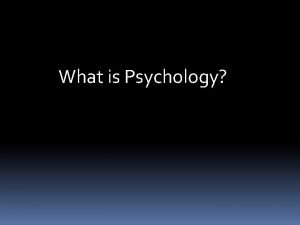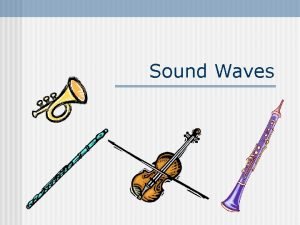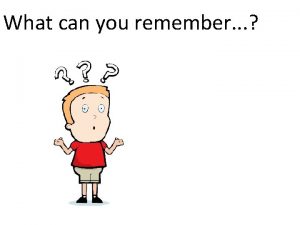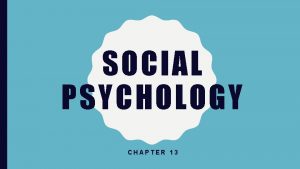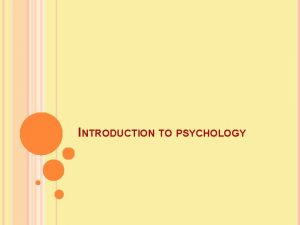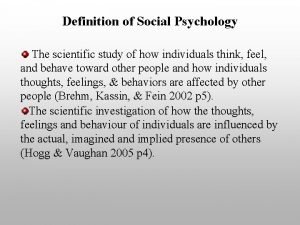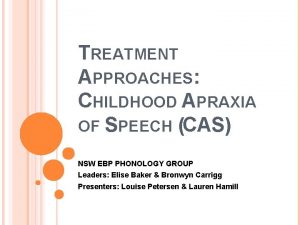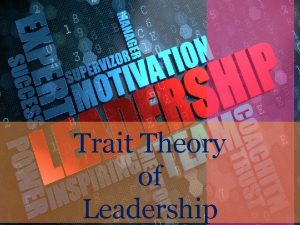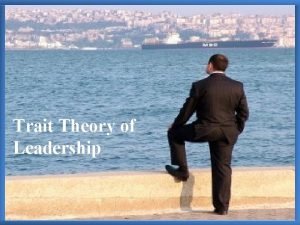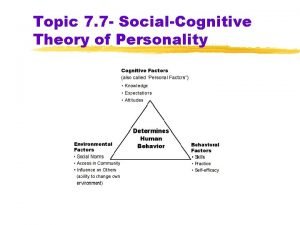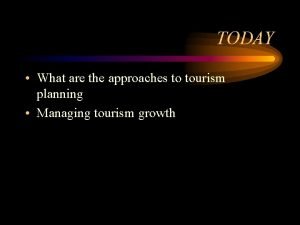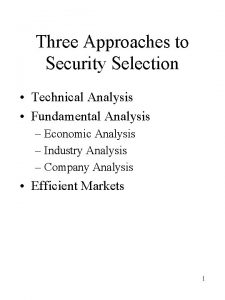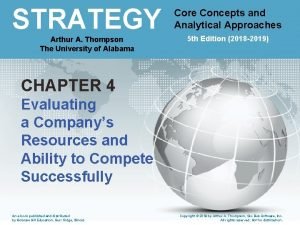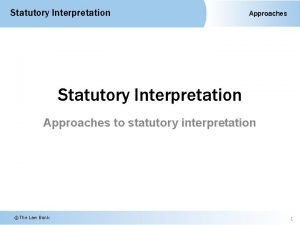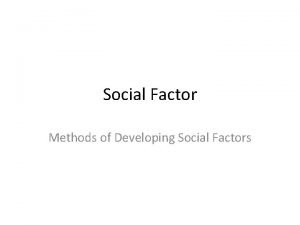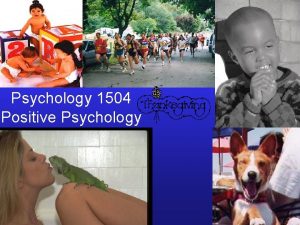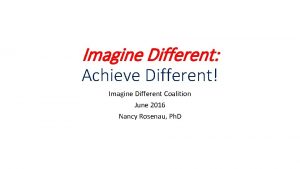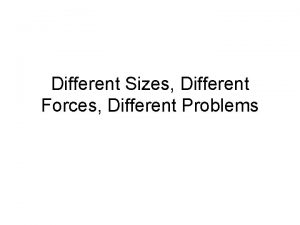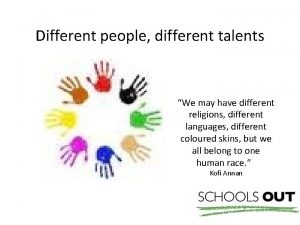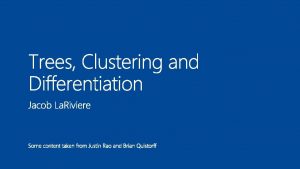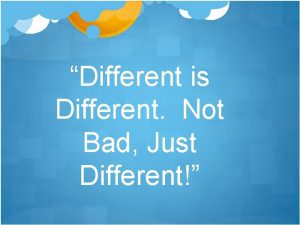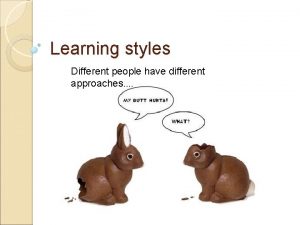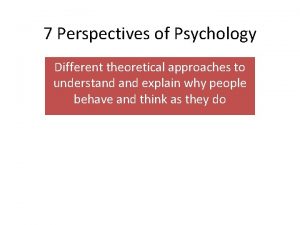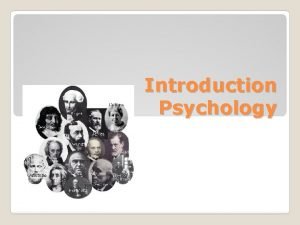Approaches to Psychology 1 The Different Approaches The





















































































- Slides: 85

Approaches to Psychology 1

The Different Approaches The problems you wish to investigate are tied to a number of theoretical approaches to psychology There are six basic approaches to the study of psychology (some psychologists also include a seventh approach) 2

Seven Approaches 1. 2. 3. 4. 5. 6. 7. Evolutionary Biological Behavioral Cognitive Humanistic Psychodynamic Sociocultural 3

Application How do you explain the causes of depression? How do you examine the personality of an assassin? 4

Application #2 How can we explain the power of cult leaders? What social conditions exist that promote the rise of cults? 5

Application #3 How could you investigate the causes of mental illness? 6

Application #4 How could you explain the reasons for obedience to authority? 7

Application #5 How could you achieve a better understanding of why a person would commit suicide? 8

Application #6 Where would you look if you wanted to understand how and why some people seem so extraordinary and important in our society? 9

Overview of Each Approach Biological: Focuses primarily on the activities of the nervous system, the brain, hormones, and genetics Psychodynamic: Emphasizes internal, unconscious conflicts; the focus is on sexual and aggressive instincts that collide with cultural norms 10

Overview (cont. ) Behavioral: Examines the learning process, focusing in particular on the influence of rewards and punishments Evolutionary: Investigates how primal survival instincts can influence behavior 11

Overview (cont. ) Cognitive: Focuses on the mechanisms through which people receive, store, and process information Humanistic: Emphasizes an individual’s potential for growth and the role of perception in guiding mental processes and behavior 12

Overview (cont. ) Sociocultural: Explores how behavior is shaped by history, society, and culture 13

The Evolutionary Approach Functionalism Why we do what we do The influence of Charles Darwin 14

Natural Selection An evolutionary process in which individuals of a species that are best adapted to their environments are the ones most likely to survive; they then pass on these traits to their offspring 15

James’s Adaptation of Darwin’s Principles “The most adaptive behaviors in an individual are the ones that grow stronger and become habitual. ” 16

Key Points in the Evolutionary Approach The adaptive value of behavior The biological mechanisms that make it possible The environmental conditions that either encourage or discourage behavior 17

The Adaptive Value Evolutionary psychology examines behaviors in terms of their adaptive value for a species over the course of many generations 18

An Example from the Evolutionary Perspective Male vs. Female: differences in visual-spatial ability Hunting vs. gathering 19

Other Examples Fear of snakes and spiders Greater sexual jealousy in males Preference for foods rich in fats and sugars Women’s greater emphasis on a potential mate’s economic resources 20

Other Evolutionary Notions Mating preferences, jealousy, aggression, sexual behavior, language, decision making, personality, and development Critics 21

The Biological Approach Behavior and mental processes are largely shaped by biological processes It is not identified with any single contributor 22

The Biological Focus The brain and central nervous system Sensation and perception Autonomic nervous system Endocrine system Heredity and genetics 23

Biological Focus (cont. ) The physiological basis of how we learn and remember The sleep-wake cycle Motivation and emotion Understanding the physical bases of mental illnesses such as depression and schizophrenia 24

Major Contributors 25

Howard Gardner Studied brain damage and neurological disorders Created theory of multiple intelligences The different types of intelligence 26

Hans Eysenck Importance of genetics Intelligence is inherited Personality has a biological component Hierarchy of personality traits 27

Roger Sperry Split-brain surgery Techniques for measuring the different functions of the hemispheres of the brain Application: epilepsy 28

William James Humans are motivated by a variety of biological instincts Instincts are inherited tendencies The father of American psychology 29

Masters & Johnson Study of human sexuality They used physiological recording devices to monitor bodily changes of volunteers engaging in sexual activity Insights into sexual problems 30

Judith Rodin Study on obesity Genetic predispositions 31

David Mc. Clelland Achievement and motivation Characteristics of high -achieving people 32

Stanley Schachter Studied eating behavior Manipulation of external cues 33

Elizabeth Loftus Study of memory Eyewitness testimony Myth or repressed memories? 34

Gustav Fechner Psychophysics: the study of the relationship between sensory experiences and the physical stimuli that cause them Revolutionized the field of experimental psychology 35

David Hubel Nobel Prize winner (transforming sensory information) Implantation of electrodes into the cortex of a cat 36

Erik Kandel Molecular biologist and Nobel Prize winner Learning results in the formation of new memories 37

Hermann Von Helmholtz Color vision: color receptors in the retina transmit messages to the brain when visible lights of different wavelengths stimulate them 38

Paul Ekman Emotions and how the human face expresses them Human emotions are universal 39

The Psychodynamic Approach 40

The Psychodynamic/ Psychoanalytic Approach Examines unconscious motives influenced by experiences in early childhood and how these motives govern personality and mental disorders Free association and psychoanalysis 41

Sigmund Freud The “Father of psychoanalysis” The second mind, unconscious Repression, free association, dream analysis Theory of personality 42

Carl Jung Analytical psychology Personal and collective unconscious Archetypes 43

Alfred Adler Individual psychology Striving for perfection, compensation, and the inferiority complex Ordinal position 44

Anna Freud Founder of child psychoanalysis Defense mechanisms 45

Erikson A neo-Freudian A strong need for social approval Psychosocial development and crises 46

The Humanistic Approach 47

The “Third Force” in Psychology Rejected the views of both behaviorism and psychoanalytic thought Free will and conscious choice 48

The Humanists Revolt Humanists felt that both behaviorist and psychoanalytic perspectives were dehumanizing Humanists believed that behaviorism and psychoanalysis ignored personal growth An optimistic view of human potential 49

More Differences Choices are not dictated by instincts, the biological process, or rewards and punishments The world is a friendly, happy, secure place 50

Carl Rogers In the 1940 s, humanism began to receive attention because of Rogers Human behavior is governed by each individual’s sense of self The drive for personal growth 51

Application of the Humanistic Approach Greatest contribution comes in the area of therapy Client-centered therapy 52

Abraham Maslow Hierarchy of needs, theory of motivation Becoming fully selfactualized Emphasis on uniqueness 53

Albert Ellis Creator of rationalemotive therapy Self-defeating thoughts cause depression and anxiety “I must be loved by all” is an unrealistic notion 54

Criticisms of the Humanistic Approach Not all people have the same needs or meet them in a hierarchical fashion The humanistic approach is vague and unscientific 55

The Cognitive Approach 56

The Cognitive Perspective Studies people’s mental processes in an effort to understand how humans gain knowledge about the world around them Cognito = Latin for “knowledge” How we learn, form concepts, solve problems, make decisions, use language 57

What Is Cognition? An “unobservable” mental process The study of consciousness, physiological determinants of behavior 1950 s-1960 s: new understanding of children’s cognitive development 58

Advocates of the Cognitive Approach The manipulation of mental images can influence how people behave The focus is not on “overt” behavior The cognitive method can be studied objectively and scientifically 59

Wilhelm Wundt He used “introspection” as a research technique He set up the first psychology laboratory Voluntarism 60

Edward Titchener Structuralism The mind is structured by breaking down mental experiences into smaller components 61

Jean Piaget Child psychologist Educational reforms Children are not “blank slates” 62

Noam Chomsky Infants possess an innate capacity for language Transformational grammar 63

Albert Bandura Social Cognitive Theory: a form of learning in which the animal or person observes and imitates the behavior of others Cognitive learning theory/expectancies 64

Lawrence Kohlberg How children develop a sense of right and wrong He borrowed from Piaget Moral questions 65

Albert Ellis RET/Changing unrealistic assumptions People behave in rational ways Role playing 66

Hans Eysenck Trait theory and personality development 67

Aaron Beck A cognitive therapist Maladaptive thought patterns cause a distorted view of oneself that leads to problems 68

Stanley Schachter “Misery loves company” Anxiety and companionship 69

Howard Gardner Multiple forms of intelligence 70

The Behavioral Approach 71

What Is Behaviorism? Focuses on observable behavior and the role of learning in behavior Behaviorism continues to influence modern psychology The role of reward and punishment in learning 72

Applications of Behaviorism Aggression Drug abuse Self-confidence issues Overeating Criminality 73

John Watson The father of behaviorism Psychology should become a science of behavior Environment molds the behavior of us all 74

Ivan Pavlov Nobel Prize winner Psychic reflexes Classical conditioning 75

B. F. Skinner A strict behaviorist Operant conditioning: rewards and punishments 76

Edward Thorndike Studied animal thinking and reasoning abilities The puzzle box, instrumental learning Laid the groundwork for operant conditioning 77

The Sociocultural Approach 78

Why Has Psychology’s Focus Been So Narrow? Cross-cultural research is costly, difficult, and time consuming Psychology has traditionally focused on the individual, not the group Cultural comparisons may fostereotypes 79

Sociocultural Issues Ethnicity Gender issues Lifestyles Income The influence of culture on behavior and the mental process 80

Stanley Milgram Classical experiment on obedience to authority 81

Solomon Asch 1950 conformity study showed that people tend to conform to other people’s ideas of truth even when they disagree with those ideas 82

Harry Harlow Challenged drivereduction theory Surrogate mothers Contact comfort 83

Albert Bandura Social learning and modeling Learning and aggression 84

Arthur Jensen Cultural differences in IQ Is IQ inherited? 85
 Literary approaches
Literary approaches Formalist approach
Formalist approach Three approaches of probability
Three approaches of probability Approaches to industrial relations
Approaches to industrial relations Inductive method of teaching
Inductive method of teaching Approaches to corporate governance
Approaches to corporate governance Linear perspective ap psychology
Linear perspective ap psychology How did wilhelm wundt break down consciousness
How did wilhelm wundt break down consciousness Seven approaches to psychology
Seven approaches to psychology Structuralism vs functionalism psychology
Structuralism vs functionalism psychology Module 2 today's psychology and its approaches
Module 2 today's psychology and its approaches Where do most psychologists work
Where do most psychologists work Carl rogers humanistic approach
Carl rogers humanistic approach Seven approaches to psychology
Seven approaches to psychology Why do different polymers have different properties
Why do different polymers have different properties Technicolor test
Technicolor test Sound will travel at different speeds in different mediums.
Sound will travel at different speeds in different mediums. Library thinkquest org 19537
Library thinkquest org 19537 Cultural relativism
Cultural relativism Different angle different story
Different angle different story Acids and bases song lyrics
Acids and bases song lyrics Different materials have different
Different materials have different Things that make us different
Things that make us different Argumenterande tal struktur
Argumenterande tal struktur Positive psychology ap psychology definition
Positive psychology ap psychology definition Two factor theory psychology
Two factor theory psychology Fundamental attribution error ap psychology
Fundamental attribution error ap psychology History and origin of science of psychology slideshare
History and origin of science of psychology slideshare Social psychology definition psychology
Social psychology definition psychology Health psychology definition ap psychology
Health psychology definition ap psychology Hát kết hợp bộ gõ cơ thể
Hát kết hợp bộ gõ cơ thể Bổ thể
Bổ thể Tỉ lệ cơ thể trẻ em
Tỉ lệ cơ thể trẻ em Voi kéo gỗ như thế nào
Voi kéo gỗ như thế nào Chụp phim tư thế worms-breton
Chụp phim tư thế worms-breton Chúa yêu trần thế alleluia
Chúa yêu trần thế alleluia Môn thể thao bắt đầu bằng từ chạy
Môn thể thao bắt đầu bằng từ chạy Thế nào là hệ số cao nhất
Thế nào là hệ số cao nhất Các châu lục và đại dương trên thế giới
Các châu lục và đại dương trên thế giới Công thức tiính động năng
Công thức tiính động năng Trời xanh đây là của chúng ta thể thơ
Trời xanh đây là của chúng ta thể thơ Mật thư tọa độ 5x5
Mật thư tọa độ 5x5 Phép trừ bù
Phép trừ bù độ dài liên kết
độ dài liên kết Các châu lục và đại dương trên thế giới
Các châu lục và đại dương trên thế giới Thể thơ truyền thống
Thể thơ truyền thống Quá trình desamine hóa có thể tạo ra
Quá trình desamine hóa có thể tạo ra Một số thể thơ truyền thống
Một số thể thơ truyền thống Cái miệng xinh xinh thế chỉ nói điều hay thôi
Cái miệng xinh xinh thế chỉ nói điều hay thôi Vẽ hình chiếu vuông góc của vật thể sau
Vẽ hình chiếu vuông góc của vật thể sau Thế nào là sự mỏi cơ
Thế nào là sự mỏi cơ đặc điểm cơ thể của người tối cổ
đặc điểm cơ thể của người tối cổ Giọng cùng tên là
Giọng cùng tên là Vẽ hình chiếu đứng bằng cạnh của vật thể
Vẽ hình chiếu đứng bằng cạnh của vật thể Vẽ hình chiếu vuông góc của vật thể sau
Vẽ hình chiếu vuông góc của vật thể sau Thẻ vin
Thẻ vin đại từ thay thế
đại từ thay thế điện thế nghỉ
điện thế nghỉ Tư thế ngồi viết
Tư thế ngồi viết Diễn thế sinh thái là
Diễn thế sinh thái là Dot
Dot Số nguyên tố là gì
Số nguyên tố là gì Tư thế ngồi viết
Tư thế ngồi viết Lời thề hippocrates
Lời thề hippocrates Thiếu nhi thế giới liên hoan
Thiếu nhi thế giới liên hoan ưu thế lai là gì
ưu thế lai là gì Hổ sinh sản vào mùa nào
Hổ sinh sản vào mùa nào Sự nuôi và dạy con của hươu
Sự nuôi và dạy con của hươu Hệ hô hấp
Hệ hô hấp Từ ngữ thể hiện lòng nhân hậu
Từ ngữ thể hiện lòng nhân hậu Thế nào là mạng điện lắp đặt kiểu nổi
Thế nào là mạng điện lắp đặt kiểu nổi Wid approach
Wid approach Approaches meets masters
Approaches meets masters Cas treatment approaches
Cas treatment approaches Trait theory of leadership
Trait theory of leadership Trait approaches to leadership
Trait approaches to leadership Social cognitive theory of personality
Social cognitive theory of personality Boosterism approach to tourism planning
Boosterism approach to tourism planning What are the three approaches to security?
What are the three approaches to security? What do you guess the doctor gives coyotito?
What do you guess the doctor gives coyotito? A company's resources and capabilities represent
A company's resources and capabilities represent Mischief rule
Mischief rule Planning a software project
Planning a software project Social factors
Social factors Semantic structure of a word
Semantic structure of a word
